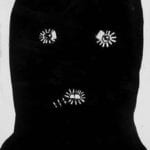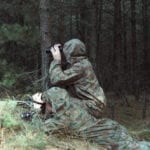 Technology
Technology  Technology
Technology  Movies and TV
Movies and TV 10 Ridiculous Riffs on Robin Hood
 Technology
Technology 10 Extreme Structures We Might See in the Future
 Miscellaneous
Miscellaneous 10 Catastrophic Translation Fails in History
 History
History 10 Wild Facts About the Mutiny on the HMS Wager
 Our World
Our World 10 Secrets Places You Won’t Believe
 Creepy
Creepy Ten Mythical German Beasts Guaranteed to Give You Nightmares
 Pop Culture
Pop Culture 10 Alternate Takes on Romeo and Juliet
 Travel
Travel 10 Christmas Towns Whose Name Has Nothing to Do with the Holiday
 Miscellaneous
Miscellaneous 10 Newer Christmas Traditions and Their Backstories
 Technology
Technology The 10 Most Compelling Aircraft That Didn’t Succeed
 Movies and TV
Movies and TV 10 Ridiculous Riffs on Robin Hood
 Technology
Technology 10 Extreme Structures We Might See in the Future
Who's Behind Listverse?

Jamie Frater
Head Editor
Jamie founded Listverse due to an insatiable desire to share fascinating, obscure, and bizarre facts. He has been a guest speaker on numerous national radio and television stations and is a five time published author.
More About Us Miscellaneous
Miscellaneous 10 Catastrophic Translation Fails in History
 History
History 10 Wild Facts About the Mutiny on the HMS Wager
 Our World
Our World 10 Secrets Places You Won’t Believe
 Creepy
Creepy Ten Mythical German Beasts Guaranteed to Give You Nightmares
 Pop Culture
Pop Culture 10 Alternate Takes on Romeo and Juliet
 Travel
Travel 10 Christmas Towns Whose Name Has Nothing to Do with the Holiday
 Miscellaneous
Miscellaneous 10 Newer Christmas Traditions and Their Backstories
10 Chilling Theories Regarding The Dyatlov Pass Incident
The events that occurred in the Ural Mountains at the beginning of February 1959, what would become known as the Dyatlov Pass incident, remain one of the 20th century’s most mysterious encounters—not least because we still don’t have a satisfactory or widely accepted explanation for why nine experienced hikers lost their lives in brutal ways.
Their tent was found in ruins, cut from the inside. Several of the hikers were discovered barefoot and almost naked near the original campsite around a month after their disappearance. What is interesting is that a trail of footprints—some barefoot—led from the tent and then simply stopped. The rest were discovered almost three months later, buried under snow in a ravine.
Just what happened to them? Why did they leave their tent, some barefoot, in the middle of the night in brutally cold temperatures, an act that would certainly guarantee their deaths? Here are ten theories as to just what happened.
10 It Was An Avalanche, Right?
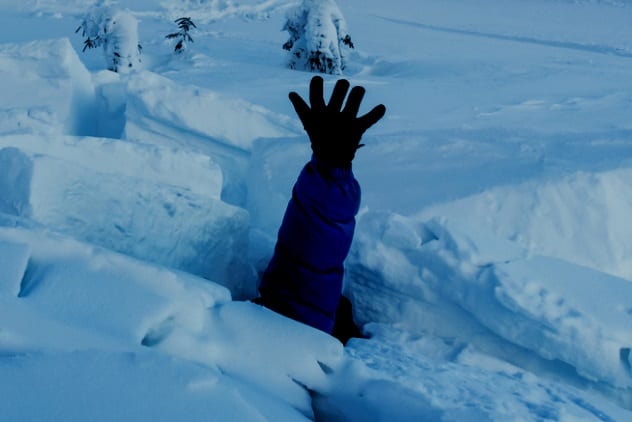
The most obvious explanation would be that the group, for all their experience, were the unfortunate victims of a freak avalanche. Case solved, right? Well, not quite. First of all, the area has absolutely no history of avalanches, certainly none that would cause outright death.[1] Secondly, even if this was a freak occurrence that just happened to hit on the night when hikers just happened to be on that part of the mountainside, there was simply no evidence of an avalanche when searchers eventually combed the area in search of the missing hikers.
Aside from there being no evidence of an avalanche, the injuries eventually discovered on the recovered bodies didn’t line up with such an incident. Although this explanation was very much promoted at one time—and even now, some people insist this is what happened—it simply does not add up. Furthermore, such insistence, against the obvious facts, could be argued to suggest a cover-up of sorts.
9 It Was A UFO
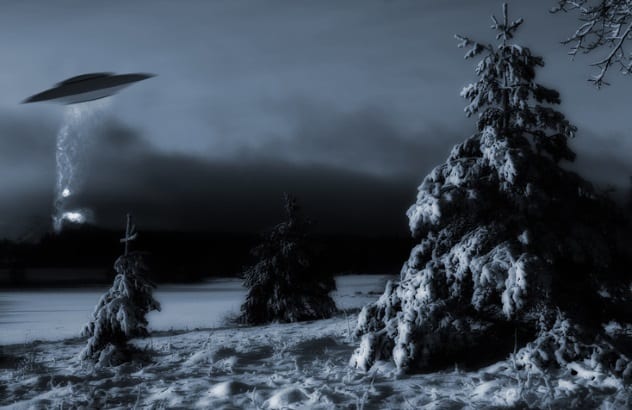
Okay, let’s get this one out of way. It was a UFO! That is certainly the theory of some researchers.[2] And while there is no evidence to suggest they are correct, there are some interesting details to examine that might suggest involvement of a highly advanced craft from another world.
For example, where two of the hikers were discovered, next to the burned-out remains of a campfire, there was substantial damage to the trees that overlooked their makeshift base. The damage was around 4.6 meters (15 ft) high. Some researchers have theorized that this was the result of a UFO hovering just above the treetops.
Furthermore, some of the group who would be discovered months after they disappeared were found with pieces of skin, lips, and eyes apparently surgically removed. While some claim these “injuries” were merely the result of decomposition, others say the seemingly precise cuts suggest intelligent action.
8 The Yeti Claims
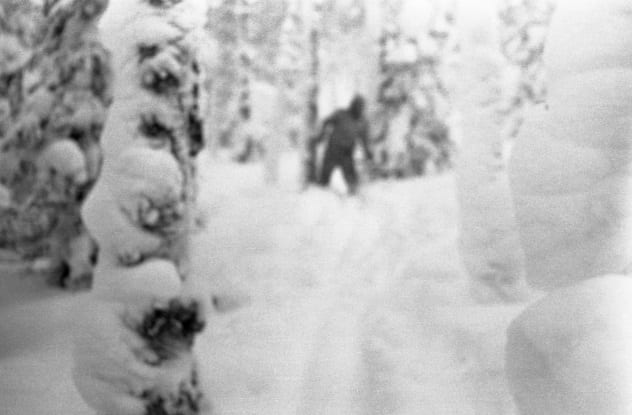
Perhaps one of the most interesting claims is that the group met their grisly end at the hands—or should that be claws—of a Yeti or Bigfoot-like creature that inhabits the remote regions of the Ural Mountains.[3] The local Mansi tribe has legends of a Yeti-like creature called the Menk, and furthermore, it is said to roam the area of the incident.
There is a famous picture recovered from the belongings of the group on Nikolai Thibeaux-Brignolle’s camera. On a shot known as “Frame 17,” there is a strange picture that seems to show a figure that bears a resemblance to a Bigfoot-type creature.
Some people believe that this “figure” was actually one of the hikers returning from a raised piece of land, probably looking to get their bearings. The fact that it was the last picture Thibeaux-Brignolle took, though, leads to some people perhaps reading more into what there actually is. Or perhaps it wasn’t a Bigfoot or one of the group? Perhaps, as our next entry looks at, it was something potentially more menacing.
7 Escaped Prisoners
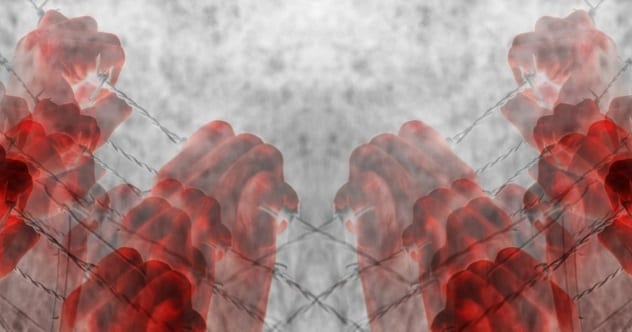
Less talked-about is the claim that the hikers were the unfortunate victims of escaped prisoners from the gulags in the region.[4] Many such prisoners, who very well may have been incarcerated since World War II and wouldn’t be at all up to speed with world events, would have been imprisoned in these facilities. To them, the conflict could very much have still been taking place unless they had other, inside knowledge.
Furthermore, being spotted by strangers could result in an attack from these desperate people—themselves potentially hardened from the war and untold time behind bars with no freedom whatsoever. They would, one would imagine, weigh up the options of attacking a (relatively) small group against the risk of being reported to the Soviet authorities, which would lead to many years back in the brutal gulags.
6 The Gulag Authorities Killed Them By Mistake

In addition to the potential threats from escaped gulag prisoners, the gulag authorities themselves were likely to shoot first and ask questions later, particularly in the region the hikers were.[5] We should bear in mind that they were off-course and somewhere they had not planned to be.
Might the gulag authorities, perhaps conducting a standard patrol of the area or maybe looking for an escaped prisoner, have been a little eager for a potential apprehension and killed the hikers in error? Imagine the anger from the local population if this was to become known. Perhaps, then, a cover-up was decided upon? Note, however, that a potential hole in this theory and the one above is that the nearest gulag was reportedly about 100 kilometers (60 mi) from where the incident took place.
While there is no proof that gulag guards killed the hikers and covered it up, there is certainly enough murkiness around the incident for people to be suspicious. Also, it was the Cold War, a time when distrust, even among a country’s citizens, ran deep. In fact, the notion that the Cold War played a major part in this mysterious incident carries over into our next entry.
5 American Intelligence Involvement

There are some claims that the incident was a result of a CIA/KGB meeting involving the handing over of radioactive materials which ultimately resulted in the deaths of nine Soviet citizens.[6] There is no real proof to these claims, and they rely heavily on the simple fact that the Cold War was in its heyday at the time. And, if there was any chance at all that the United States could have been placed in a negative light, the Soviets would have taken it.
However, there is reason to believe there could have been a type of “entrapment” scenario unfolding. For example, there were considerable indications of radiation, both in the area itself and on some of the dead hikers.
Rumors would surface that the incident was an attempt to plant radioactive materials on CIA agents “caught” behind Soviet lines. Somehow, the operation went wrong, and the hikers were killed. If this theory was true, then that would mean that at least one of the hikers was a KGB operative. And that is the subject of our next entry. What’s more, there is sufficient reason to believe that there really could have been a KGB presence in the Ural Mountains.
4 A KGB Plant?
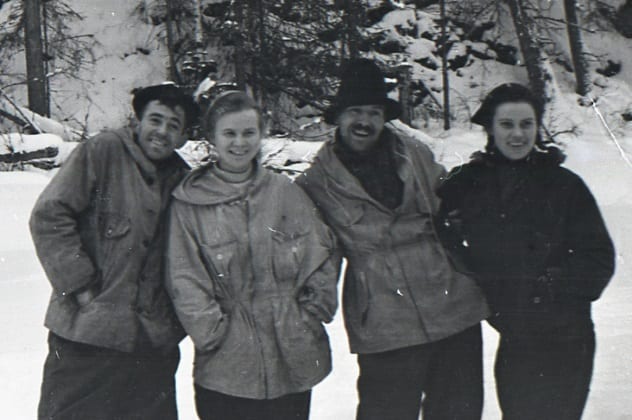
There are several theories that the “hike” into the mountains was secretly, and against the majority of the hikers’ knowledge, a KGB operation.[7] Perhaps one of the most interesting aspects of these claims is the fact that the oldest member of the group, 37-year-old Semyon (aka Alexander) Zolotaryov (second from right above), was not only a last-minute addition but also reportedly had extensive military and combat training. Why, exactly, was he there?
Perhaps the tattoo on his body is worth paying more attention to by researchers into this most mysterious case? The tattoo read “DAERMMUAZUAYA.” According to those who have researched the word, there is no translation in any known language. Many assume it to be either a secret military tag or some kind of secret society moniker.
If there is any truth to Zolotaryov, or any of the Dyatlov crew, being KGB agents, what their mission might have been is still anyone’s guess.
3 Local Tribes
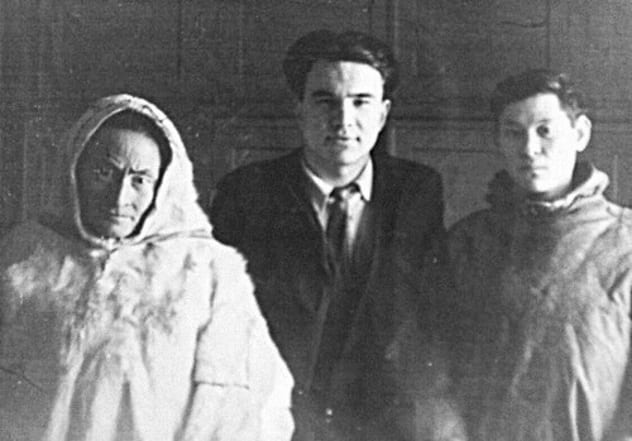
Some theories would persist that the deaths were the result of attacks from local tribes in the area, most notably the Mansi tribe.[8] There is no real evidence of this; the Mansi were largely peaceful and uninterested in the outside world.
Furthermore, much like the details already mentioned when examining the apparent “escape” from their tent, there was no evidence in the surrounding snow—which was largely undisturbed—of such an approach by a tribe, who wouldn’t have been thinking at all of covering their tracks, certainly not after an attack. And for an attack to happen at night in the middle of an apparent blizzard is even more unlikely.
While they certainly make a convenient scapegoat, there is absolutely no evidence whatsoever that the Mansi, or any other tribe in the area, were responsible for these most sudden and strange deaths. It perhaps should be noted, tough, that the local tribes did refer to the mountain where the incident took place as the “Mountain of the Dead.”
2 The Gravity Fluctuation Theory

Perhaps one of the most bizarre theories, albeit one that is grounded in scientific thought, is the gravity fluctuation theory.[9] What this theory essentially argues is that there was a sudden drop in gravity in a “corridor” that the hikers were unfortunately camped in. This is a little-known (and unproven) phenomenon, but it does, at least in theory, explain the eventual location of the campers’ bodies.
For example, it is argued that those who first rushed outside the camp were essentially placed into a non-gravitational situation where they died instantly—as if they were in a vacuum. The others were dragged from the tent, which would explain the “tears from the inside.” They were literally ripped from the tent due to the sudden and dramatic drop in gravity. It is argued that this unusual phenomenon occurs more than people realize but rarely results in such a drastic situation, as people aren’t usually caught in the event. Some researchers even claim that if the hikers had simply kept their tent shut, they would have survived the rare incident.
1 Secret Weapon Tests
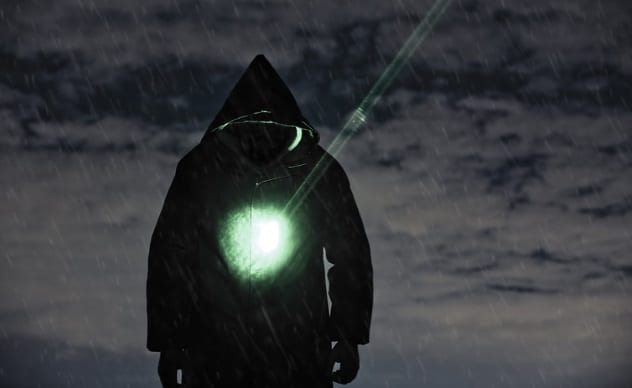
This theory could explain the mysterious deaths, reports of strange lights, and the air of secrecy with which the Soviet authorities handled the incident.
Many rumors persisted in the area that the Soviets would regularly test secret weapons. Some have even claimed that “neutron weapons” were in use.[10] The injuries of some of the campers—who had severe internal trauma but little external damage—would certainly suggest some sort of advanced and secretive technology.
Might it be possible that the Soviet military were testing weapons designed to “scare” the United States, for example, only to kill nine of its own citizens? Much like the gulag theories, this scenario would result in an instant and deep cover-up.
+ The One That Got Away
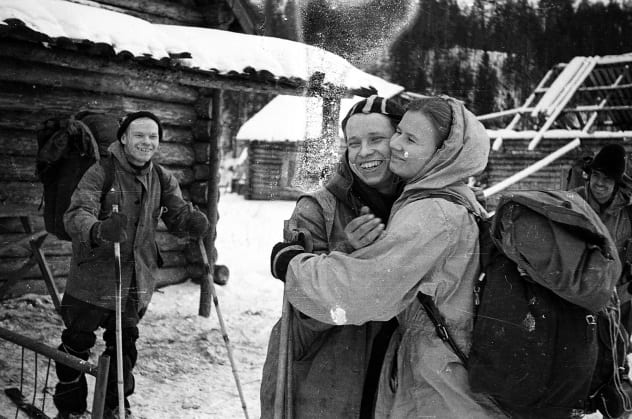
Perhaps one of the most intriguing aspects of the whole dire and terrible situation is that of Yuri Yudin.[11] Only 24 hours into the ill-fated excursion, Yudin (pictured above being hugged) would come down with an illness, severe enough that he had to return to their set-off point. Knowing what we now know of the group’s situation, it was perhaps the most well-timed illness in the entirety of the 20th century.
Whatever the sickness was, it ultimately saved his life. Indeed, it perhaps makes one ponder the precariousness of our existence, where one circumstance seemingly as innocent and trivial as being too ill to participate can ultimately result in saving one’s life. Regardless, the decision would allow Yudin to live to old age, which he did, although he never had anything of significance to add to the investigations into the deaths of his colleagues.
Read about more bizarre, unexplained deaths on 10 Mysterious Deaths Connected To Conspiracy Theories and 10 Mysterious Deaths That History May Never Fully Explain.



